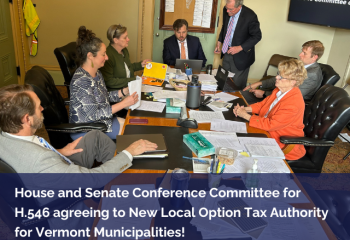VLCT has identified housing, community development and land-use as a key topic to follow during the 2024 legislative session. Check back for the latest updates on this issue. Or, view our Weekly Legislative Reports page to see everything we're following.
Update coming soon! When updating our Advocacy Update webpages, we are giving priority coverage to the topic(s) that are currently being shaped and voted on.
Please see the relevant bills listed in this May 10, 2024 summary.
The Senate Committee on Natural Resources and Energy continued their walk-through of H.687, an Act 250 bill, with the goal of cross referencing and merging with elements of S.311 that they wish to keep. Legislative Counsel Ellen Czajkowski created a helpful section-by-section summary of H.687 that can be found here. The Committee continues to take notes and highlight sections they want to address. They will work all next week trying to merge H.687, S.311, and elements of S.308.
Charlie Baker, Executive Director for the Chittenden County Regional Planning Commission, speaking on behalf of all regional planning commissions (RPCs), recommended sections of S.311 to include in H.687. Baker suggested adding all of the sections related to interim Act 250 jurisdictional changes and exemptions, S.100 municipal zoning clarifications, tax credits, taxes, housing programs, rental data collection, short-term rentals, flood risk disclosure, mobile homes, age-restricted housing, and reports and studies from S.311 be added. Baker further recommended that the long-term Act 250 sections (23-26 Tier structure) of S.311 not be carried over, as the relevant provisions have been worked out in H.687. See his complete testimony. It’s clear that the RPCs’ view on municipal zoning preemptions are not in line with VLCT’s; however, we agree on the need for more location-based Act 250 exemptions, extending and expanding the current interim Act 250 exemptions for housing, and less process and requirements for municipalities to qualify for Teir 1A and 1B. Please see VLCT’s latest testimony to Senate Natural Resources clarifying our concerns and recommendations.
After a marathon two session (1:00 PM; 4:43PM) floor debate, the full House passed H.687, (most current language starting on page 885) an Act 250 bill with an 89-51 vote. With his voice failing him at the end, Rep. Seth Bongartz reported the bill on behalf of the House Committee on Environment and Energy. Bongartz began the lengthy session by telling House members that the bill does four big things:
- It “fixes” Act 250 governance by creating a professional board to oversee the administration and operation of Act 250, and would have the board hear appeals of jurisdictional opinions and district commission decisions.
- It moves away from the size of a project determining jurisdiction towards a system of jurisdiction being determined by location. It relaxes jurisdiction in parts of downtowns and villages that meet certain prerequisites, while increasing jurisdiction when critical natural resources are involved.
- It establishes categories with common definitions for Regional Planning Commission future land use maps. It is these maps that will underpin the notion of Tier 1 areas - those with relaxed activity jurisdiction, Tier 3 areas - designed to protect critical natural resources, and Tier 2 which is everything in between.
- It streamlines the “Designation Program”, which confers benefits by combining the current five areas into only two categories - Centers and Neighborhoods.
The House worked through a dozen amendments to the bill, most offered by members of the Rural Caucus. They narrowly passed several additional carve-outs for housing construction: conversions of hotels and motels into permanently affordable housing would not need to alter an existing Act 250 permit, nor would conversions of commercial buildings into apartments if they include 29 units or fewer. A new provision to allow “accessory on-farm businesses” to bypass Act 250 also passed. The most consequential and time consuming of them would have stricken the language that moves Act 250 permit appeals form the court system to the new environmental board. That amendment failed as Bongartz described the appeal move as “the heart of the bill.”
Many members rose in opposition to H.687 with most concerned that the bill does little, if anything, for many rural communities that lack levels of bylaws, infrastructure, or staff resources necessary to achieve Tier 1A or Tier 1B status. Several members pointed out the inherent conflict of a professional board hearing appeals of permits after being deeply involved in the oversight of those same permits at the district commission level.
About 15 Democrats and Independents who are members of the Rural Caucus joined Republicans in voting no on the bill. H.678 will now move over to the Senate, where the Natural Resources Committee hopes to combine it with S.311. Vermont Public has a good summary of the bill and the House debate.
VLCT’s Legislative Priorities include increasing and expanding opportunities for housing development through regulatory relief and low barrier, statewide, location-based incentives. Several bills have been introduced this session with the stated goal of increasing housing opportunity, availability, and affordability. This update focuses on two large omnibus housing bills: the Senate’s Be Home Bill and H.719.
Bringing Everyone Home
The Senate Committee on Economic Development and Housing and General Affairs has introduced a draft committee bill currently known as the Be Home Bill, which has the purpose of “bringing everyone home”. This bill is far reaching and has something for every interest group to like as well as something for every interest group to dislike. The 89-page draft
includes a section that would delegate Act 250 review authority to municipalities under certain circumstances;
also addresses: building codes, water and wastewater connections, permit appeals, mitigation for loss of primary agricultural soils, release and exemption of Act 250 permits, appeals of administrative officers, and appeal bonds;
sets time limits on decisions of advisory and review panels, makes changes to municipal parking requirements, allows hotels and motels to convert to permanently affordable housing, changes lot coverage requirements and lot density, establishes new Act 250 “Tiers”, and defines the application process for municipalities to be approved for Tiers 1A and 1B;
requires a study about establishing a municipal land bank program, establishes a statewide rental registry program, requires disclosure of flood risks for residential properties, proposes a disaster resiliency investment area (somewhat like a TIFF);
establishes and/or makes changes to at least nine different housing programs; and
proposes over $40 million in appropriations.
See Dr 4.1 Bill Outline for the current section-by-section breakdown.
Despite the complexity and need to take a deep dive into many of these issues, the committee is on a fast track to move this bill out quickly. They intend to come back and further discuss areas of disagreement and consider the overlap with H.719.
While VLCT has many interests in this bill, our recent discussions and VLCT Executive Director Ted Brady’s February 2 testimony focused primarily on the municipal interests of
appeals,
by-right development,
new density requirements, and
set timelines for municipal decisions.
We welcome your feedback on VLCT’s stated concerns and any other aspects of this bill. We recognize the challenges of staying up to date on bills of this size and the significant changes expected throughout the legislative process.
Tri-Partisan Housing Solution – H.719
A large group of House members, including Democrats, Republicans, and Progressives, has put forward their solutions to the housing crisis in H.719. This, like the Senate’s proposed Be Home Bill, is a large, comprehensive bill that would affect Act 250, municipal zoning, housing programs, and tax laws. This bill has the support of the Scott administration, which provided an overview presentation on H.719 to the Senate Committee on Economic Development and Housing and General Affairs a few weeks ago. The proposed changes and simplified process for exemptions to Act 250 jurisdiction mirror requests from VLCT over the last few years. The housing appeal and municipal reforms proposed in H.719 have shared elements with the Be Home bill. This includes some areas of likely support from municipalities and some areas of real concern. In addition, the two bills overlap in proposed updates to last year’s Act 47 or Home Bill.
A major difference in the approach between these two bills comes in the form of investments or incentives to support housing development and rehabilitation. H.719 proposes tax-based incentives, outlined in the State of Vermont’s January 11, 2024, Housing Reform Legislative Priorities presentation, as opposed to the large appropriations of fiscal year 2025 General Fund dollars in the Be Home Bill. VLCT has yet to be asked to testify on H.719 but has consulted with the many legislators and administration officials pushing this bill forward.
As always, please send your feedback, questions, and concerns to advocacy@vlct.org.
Act 250 and Housing Compromise Starts to Emerge in S.311 and H.687
The Senate Committee on Natural Resources and Energy continued their walk-through of H.687, an Act 250 bill, with the goal of cross referencing and merging with elements of S.311 that they wish to keep. Legislative Counsel Ellen Czajkowski created a helpful section-by-section summary of H.687 that can be found here. The Committee continues to take notes and highlight sections they want to address. They will work all next week trying to merge H.687, S.311, and elements of S.308.
Charlie Baker, Executive Director for the Chittenden County Regional Planning Commission, speaking on behalf of all regional planning commissions (RPCs), recommended sections of S.311 to include in H.687. Baker suggested adding all of the sections related to interim Act 250 jurisdictional changes and exemptions, S.100 municipal zoning clarifications, tax credits, taxes, housing programs, rental data collection, short-term rentals, flood risk disclosure, mobile homes, age-restricted housing, and reports and studies from S.311 be added. Baker further recommended that the long-term Act 250 sections (23-26 Tier structure) of S.311 not be carried over, as the relevant provisions have been worked out in H.687. See his complete testimony. It’s clear that the RPCs’ view on municipal zoning preemptions are not in line with VLCT’s; however, we agree on the need for more location-based Act 250 exemptions, extending and expanding the current interim Act 250 exemptions for housing, and less process and requirements for municipalities to qualify for Teir 1A and 1B. Please see VLCT’s latest testimony to Senate Natural Resources clarifying our concerns and recommendations.

